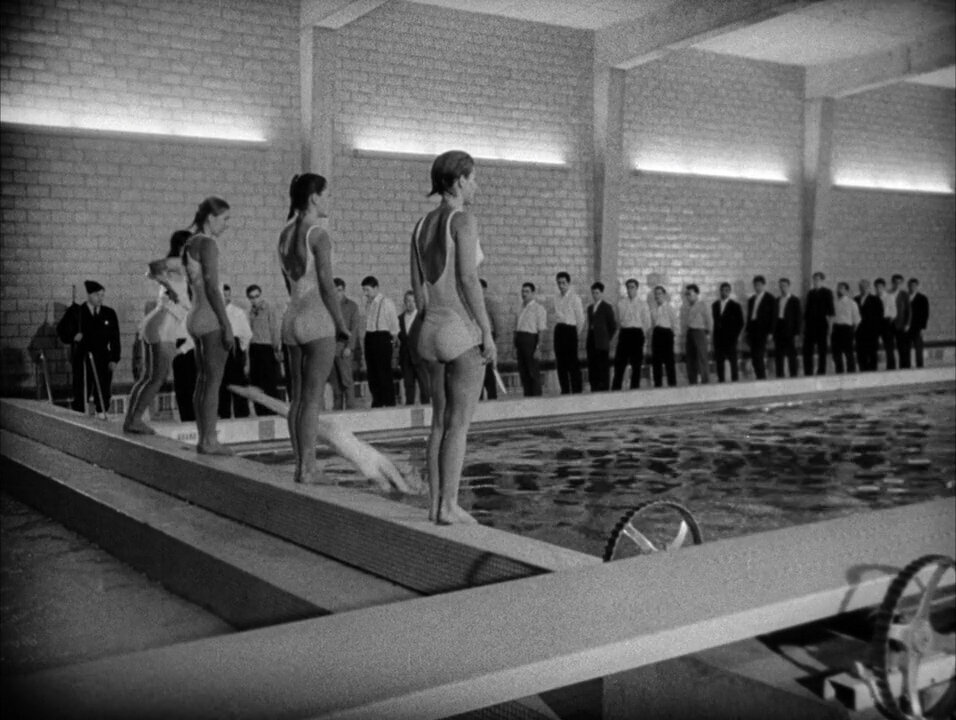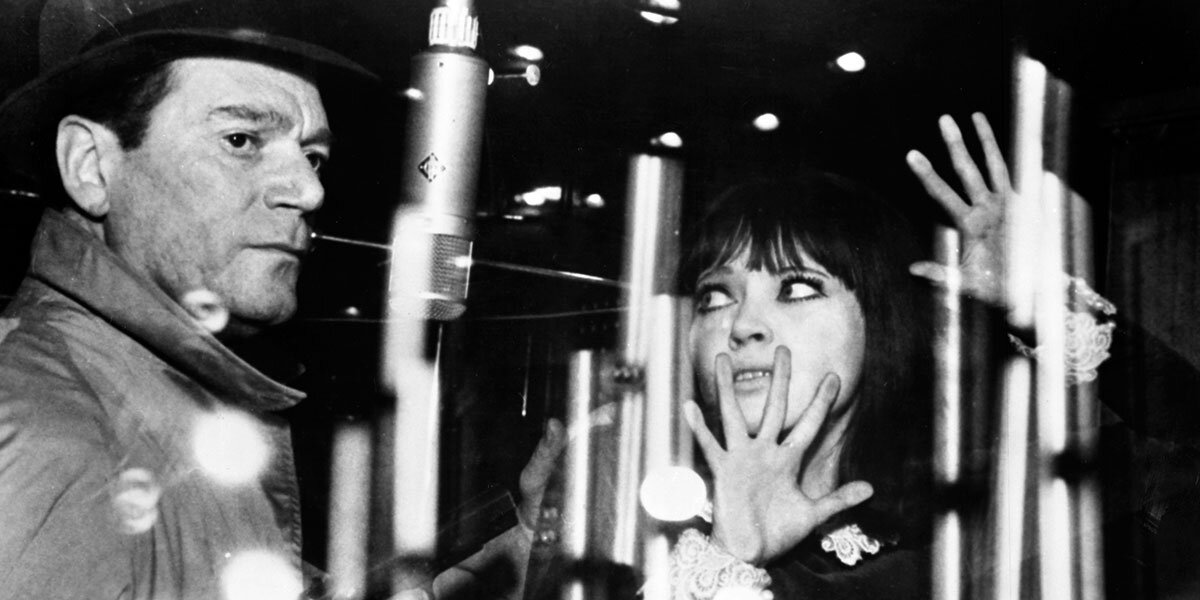ALPHAVILLE (AKA ALPHAVILLE, UNE ÉTRANGE AVENTURE DE LEMMY CAUTION)
"One of Godard's most sheerly enjoyable movies, a dazzling amalgam of film noir and science fiction."
- Time Out
Jean Luc-Godard’s ALPHAVILLE (1965) combines the genres of dystopian science fiction and Film Noir. In his endless journey to mess with cinema’s conventions and tropes, Godard took the well-known cinema hero and transposed him into a sci-fi setting. Secret agent Lemme Caution (played by Eddie Constantine), is sent to the distant space city of Alphaville where he must track down and kill the inventor of the all-controlling computer Alpha 60. With shades of George Orwell, Alpha 60 has outlawed free thought and individualist concepts like love, poetry and emotion. People who show signs of emotion are presumed to be acting illogically and are gathered up, interrogated, and executed. As a result, Alphaville is an inhuman, alienated society.
As an archetypal American anti-hero private eye in a trenchcoat and with a weathered visage, Lemmy Caution's old-fashioned machismo conflicts with the puritanical computer. This character was a hard-boiled FBI agent from English author Peter Cheyney’s series of novels in the 1930s and 1940s. While never as popular in the US, Lemmy Caution became a pre-James Bond film hero in France. American expat Eddie Constantine, a craggy-faced tough guy, portrayed Caution in seven pulp detective movies between 1953 and 1963. ALPHAVILLE is replete with hoodlums carrying guns, fisticuffs, and murder, recalling the classic gangster archetypes in American Film Noir (such as THE HITCH-HIKER, 1953, TOO LATE FOR TEARS, 1949, TRAPPED, 1949), and even the French Noir films of Jean Pierre Melville (BOB LE FLAMBEUR, 1956) and Jacques Becker.
Caution then enlists the assistance of Natacha von Braun (played by darkly luminous Anna Karina), a programmer of Alpha 60. Caution falls in love with her, and his love introduces emotion and unpredictability into the city. Her programmed responses slowly break down as the hardboiled detective introduces her to the concepts of "conscience" and "love" – words with which she is unfamiliar, since they have been progressively redacted from the dictionary that is the Bible of her father's totalitarian state. Godard ends the film on a note of romantic optimism, with Lemmy and Natasha escaping their pursuers and a dying world, fleeing to safety through intersidereal space (otherwise known as the Boulevard Périphérique) as the girl learns a new phrase: "Je vous aime.”
Diverging completely from such later science fiction films as 2001: A SPACE ODYSSEY (1968), STAR WARS (1977), BLADE RUNNER (1982), and THE MATRIX (1999), Godard brilliantly eschews futuristic sets and special props for actual Paris locations. Paris of the 1960s was undergoing a dramatic architectural and economic transformation that would see the unprecedented redesign and reconstruction of entire urban districts. The last time Paris had been subjected to such large-scale transformation in its built environment had been through Baron Hausmann’s mass urban plan for Paris in the 1850s and 1860s, designed as much to prevent revolution and fire than for beautification.
Godard’s increasing fascination with Marxism and critical theory had given cinematic shape to his films as a form of social critique; they strove to express his anxieties about the creeping anonymity and alienation of an Americanized globalization. During the 1950s and 1960s, as European economies were emerging from postwar austerity, De Gaulle’s then Minister of Culture, André Malraux, would oversee a vast project designed to “rehabilitate” the historic neighborhoods of the urban center around Le Marais, which included the scrubbing and cleaning of facades and the transformation of residential buildings into office blocks and commercial units. Low slung, classic historic edifices gave way to vertical skyscrapers of glass and steel – Capitalist Modernity – culminating in the Montparnasse Tower, completed in 1973. The price of land sky-rocketed; this served only to push workers and the lower middle classes to the peripheries while depopulating the central arrondissements, further entrenching income and housing inequality while celebrating a new global consumerism of elite, modern flats and domestic technologies. Godard’s ALPHAVILLE, released in 1965, locates itself at the absolute epicenter of these changes.
The stark urban, tonality of ALPHAVILLE is achieved in great part through the Noir-ish shadows created by accomplished cinematographer Raoul Coutard, whose black-and-white photography turns everyday objects and settings – exteriors of glass buildings, electronic doors, a hotel lobby, spiral staircases, flashing signs, a swimming pool, a room full of mainframe computers, a jukebox, a Kodak Instamatic, the Paris suburbs at night – into the props of a convincingly dystopian world of the future. The neon lights and brutalist architecture lend a futuristic feel to ALPHAVILLE. An otherworldly feel is also created by scenes projected in negative imagery. The lighting and positioning of the camera, by obscuring the envelopes of buildings, serve to disorient a sense of place. For example, as Lemmy Caution drives across a section of an industrial bridge alongside a passing train, the shot obscures the storied history and grandeur of Paris, transforming it instead into an industrialized landscape of a new architectural norm. In this new 4K restoration by Studio Canal the film has never looked better.
Contents
ALPHAVILLE (AKA ALPHAVILLE, UNE ÉTRANGE AVENTURE DE LEMMY CAUTION)
(FRANCE, 1965)
Director: Jean-Luc Godard
Screenplay: Jean-Luc Godard
Cinematography: Raoul Coutard
Edited by: Agnès Guillemot
Music by: Paul Misraki
Cast: Eddie Constantine, Anna Karina,
Jean-Pierre Leaud,
Valérie Boisgel,
László Szabó,
Howard Vernon,
Christa Lang
- 99 minutes
- 35mm
- B&W
- Sound
BONUS MATERIAL
Narration Track
Audio commentary by film historian Tim Lucas.
Interview with Anna Karina
- 4:30 minutes
- Video
- Color
- Sound
Colin McCabe Introduction
- 5:30 minutes
- Video
- Color
- Sound
ALPHAVILLE
- Theatrical Trailer
BOB LE FLAMBEUR
- Theatrical Trailer
LE DOULOS
- Theatrical Trailer
TOUCHEZ PAS AU GRISBI
- Theatrical Trailer
RAZZIA SUR LA CHNOUF
- Theatrical Trailer
Aspect Ratio: Anamorphic 1.37:1
Language: French with English Subtitles
Published By: Kino Lorber
Institutional Price: DVD or Blu-ray $250 (plus shipping), Digital File Download $500
To order call: 212.280.8654 or click here for information on ordering by fax, e-mail or post.








